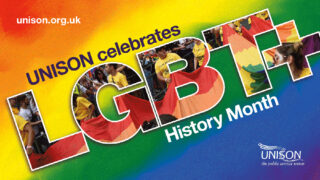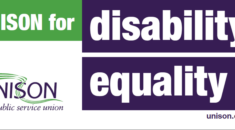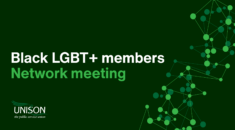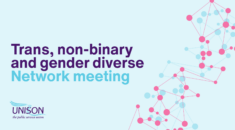As UNISON’s LGBT+ conference entered its second – and final – day, there was a celebratory air in Brighton, as the group’s organising award was announced.
Praised by vice-president Andrea Egan for the extraordinary work they did over the past year – not least because so much had to be done digitally as the pandemic continued – the award was shared by the Northern Ireland (pictured below) and North West (pictured above) regions and collected by delegates from Ms Egan.
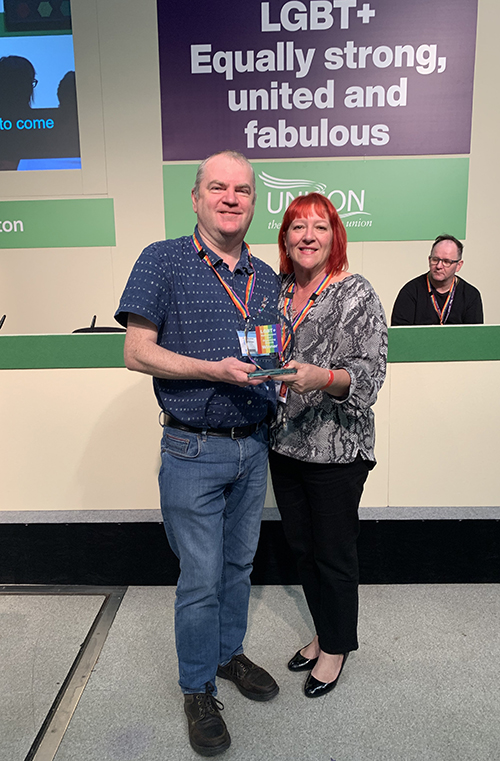
Earlier, the union’s other vice president, Kath Owen, had addressed delegates, “energised” by returning to a live conference.
She began by “thanking you all for the work that you do and continue to do.” Despite COVID-19, activists had kept the public services going to keep our country going.
And they had also kept the day-to-day work of the union going.
“The challenges facing our members … have not gone away and in some ways have got worse.”
Condemning the Conservative MPs who have second jobs that rake in thousands of pounds a year, Ms Owen observed that: “Our members across all sectors deserve a decent standard of living.”
Thanking the union’s staff for their work, she had specific praise for UNISON’s legal team, and pledged that the organisation’s national executive council would be “there for you”.
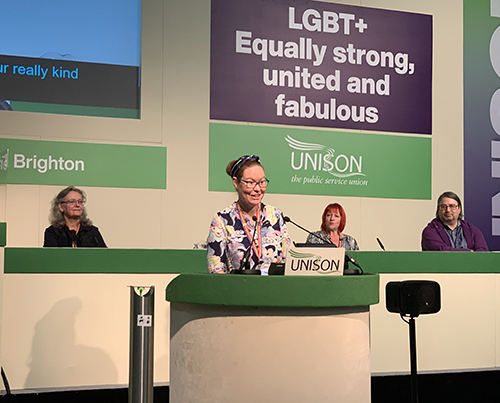
Vice president Kath Owen addressing LGBT+ conference
The final debates of conference covered a mix of topics.
For the bi+ caucus, Sophie Robinson highlighted the intolerance toward bi people that still exists, not just from heterosexuals, but from lesbian and gay people too.
The motion pointed activists toward #HubofHope, a resource to signpost the right support that LGBT+ people need.
A motion on the climate crisis for the national committee saw Penny Smith explain that it had particular relevance for LGBT+ people, as “history tells us that diminishing resources is a driver for discrimination”.
James Anthony, from the University of Birmingham Hospitals branch said that the union had “set out our clear vision for a post-COVID society,” which was more … “ethical and sustainable”. He urged activists to become green reps, to help push UNISON’s plan of greening public services in their own workplaces, concluding that there’s “no use in anything we do if we can’t live on the planet”.
Speaking on behalf of the disabled LGBT+ caucus, Maureen le Marinel addressed the police and crime bill that was agreed in the Commons in the summer.
“This police and crime bill, affects every single person in this room, affects every single person in this country, removing our right to protest, removing our right to be heard.”
She pointed out that, as conference had reiterated that Pride events are a protest, that could make it harder to stage such events in the future.
Eve Joy Wilson, from London, said that, as part of a coalition of health and social care workers, she was working with Liberty against part of the bill that would force that workforce to hand over information to the police.
Delegates agreed that, among other actions, the national committee should work with UNISON’s Labour Link to raise issues around the bill on the potential impact on trade union members, and particularly, “LGBT+, disabled, Black and women members”.
Moving a motion on racism and LGBT+ phobia in mental health services, Jennie Antonio for the Black LGBT+ caucus cited the conviction for manslaughter of the police officer who killed former football Dalian Atkinson when he was in a vulnerable mental health state.
“Training on de-escalation is not fit for purpose,” she told conference.
Delegates also heard of the lengthy waits for gender realignment appointments, with Charlie from saying that there is a particular lack of medical services for trans men’s needs. “The delays are horrendous,” he noted.
PK from Oxford University told them that a lot of people in the UK “don’t realise how dire the state of trans medical is.
“There is a chance you will not be seen for a decade – some trans people will not survive that long,” particularly given the impact on mental health of trans people.





